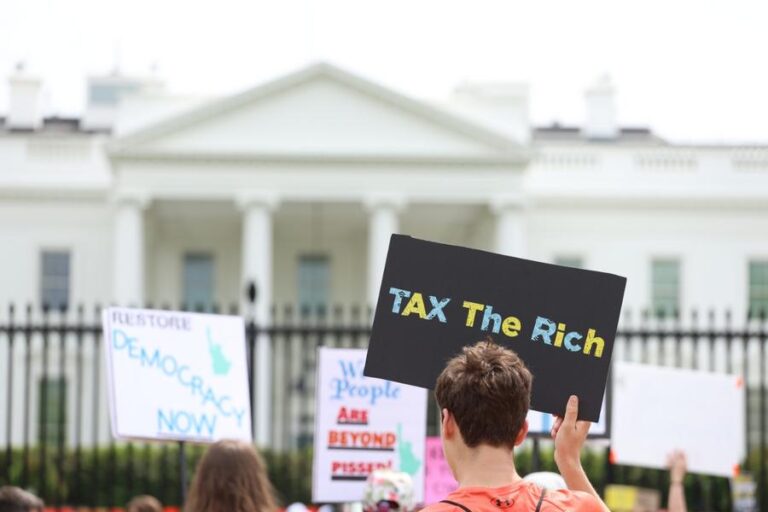The bill is “a massive wealth transfer from those at the bottom of the economy to those at the top,” said Marc Morial, president and CEO of the civil rights organization National Urban League.
WASHINGTON, June 8 (Xinhua) — Tempers are flaring on all sides over the Trump administration’s sweeping tax and spending bill.
Dubbed “The One, Big, Beautiful Bill,” the legislation is part of the administration’s core agenda, containing measures such as ramping up border security and lowering corporate and individual taxes.
“The bill … has ugly provisions for America’s most vulnerable people,” The Hill said in a recent report, noting that “it shamelessly cuts assistance for the poorest Americans to continue tax cuts for the rich.”
Citing Former Labor Secretary Robert Reich, who called the bill “ugly and disgusting” and part of “the largest redistribution of wealth in the nation’s history,” the report questioned why House Republicans passed the bill “that retains tax cuts for the rich by taking 800 billion U.S. dollars from Medicaid” while leaving 3 million policyholders without coverage under the Affordable Care Act.
Echoing this view, Marc Morial, president and CEO of the civil rights organization National Urban League, said the bill is “a massive wealth transfer from those at the bottom of the economy to those at the top.”
“In addition to betraying millions of Americans who rely on Medicaid, the Act also puts nutritional assistance out of reach for many by slashing billions from SNAP (Supplemental Nutrition Assistance Program) and creating additional hurdles to accessing both programs,” he said.
The bill has also become a major source of division in Washington — even within the Republican party itself — in an era of bitter partisan rivalry.
Indeed, the world’s two most prominent billionaires — U.S. President Donald Trump and Tesla founder Elon Musk — are in a war of words over the legislation. Musk has blasted the bill as negating the spending cuts he put in place as head of the Department of Government Efficiency.
“Without me, Trump would have lost the election, Dems would control the House and the Republicans would be 51-49 in the Senate. Such ingratitude,” Musk wrote on his social platform X on Friday.
Speaking to reporters in the Oval Office, Trump said he was “very disappointed” over Musk’s opposition to the bill. “I’m very disappointed because Elon knew the inner workings of this bill better than almost anybody sitting here, better than you people. He knew everything about it,” Trump said.
“He had no problem with it. All of a sudden, he had a problem,” he added, noting that Musk only developed the problem “when he found out that we’re going to have to cut the EV mandate.”
Trump was referring to the legislation’s elimination of electric vehicle tax credits, up to 4,000 dollars for a used EV and 7,500 dollars for a new one, which could hurt Musk’s interests as CEO of Tesla.
Soon after Trump’s Oval Office comments, Musk polled his followers on X: “Is it time to create a new political party in America that actually represents the 80 percent in the middle?” The final results showed that the poll had drawn 5.6 million votes, with over 80 percent voting “Yes.”
Meanwhile, Democrats have lambasted the bill as cutting crucial services to vulnerable segments of the population.
“This is one big, ugly bill,” said House Minority Leader Hakeem Jeffries, while reading out letters from U.S. citizens describing the harm these cuts would cause.
Freshman Democratic Representative John Mannion said the bill would eliminate food assistance for children and the elderly, deprive the disabled and the most vulnerable of healthcare, and saddle the nation with trillions of dollars in new debt.
“This bill is cruel and immoral, and its supporters rejected any attempts at bipartisan compromise,” Mannion said.
As the Congressional Budget Office warned that the bill will create a 2.4 trillion dollar gap in the U.S. national debt over the next decade, analysts have expressed skepticism over the administration’s claim that the bill will reduce the record-high national debt.
The Tax Foundation, an international nonprofit think tank, said in a recent article, “Rather than making the most pro-growth features permanent, the bill spends far too much money on political gimmicks and carveouts, resulting in a package that provides a modest boost to the economy but at a huge fiscal cost.”
The international credit rating agency Moody’s also blasted the bill, downgrading the U.S. credit rating for the third time since 2011.
“If the 2017 Tax Cuts and Jobs Act is extended, which is our base case, it will add around 4 trillion dollars to the federal fiscal primary (excluding interest payments) deficit over the next decade,” the agency said.
The bill has been submitted to the Senate for consideration, but several GOP senators, including Sen. Rand Paul, have indicated their opposition.
The Trump administration, however, said the bill is the biggest cost-cutting measure in three decades. “There’s 1.6 trillion dollars worth of savings in this bill,” White House Press Secretary Karoline Leavitt said in a recent press briefing. “That’s the largest savings for any legislation that has ever passed Capitol Hill in our nation’s history.”
Experts said that given the bill passed the House by just one vote, its future remains highly uncertain.
Republican leaders have set the July 4 deadline to ensure the bill is passed by both chambers and sent to the president for signature.
It is expected that the bill will continue to spark controversy among both parties and the public. ■

